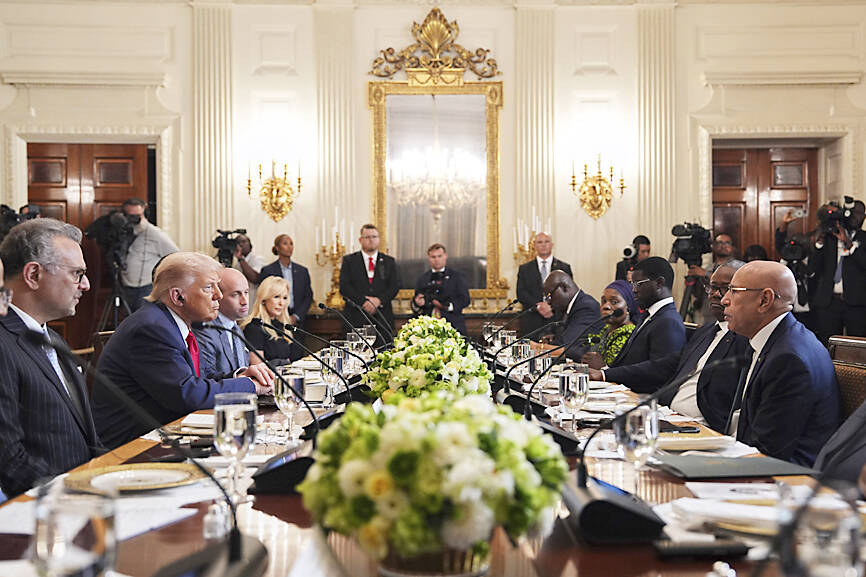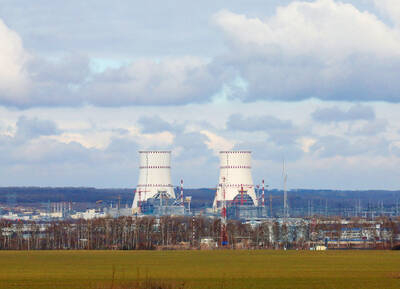US President Donald Trump on Wednesday complimented the president of Liberia on his English-speaking skills — despite English being the official language of the west African nation.
Trump was hosting a White House lunch with African leaders and — after brief remarks from Liberian President Joseph Boakai — asked the business graduate where he had picked up his linguistic know-how.
“Thank you, and such good English... Where did you learn to speak so beautifully? Where were you educated?” Trump asked.

Photo: AP
Boakai — who, like most Liberians, speaks English as a first language — indicated that he had been educated in his native country.
Trump, who was surrounded by French-speaking presidents from other west African nations, continued.
“It’s beautiful English. I have people at this table can’t speak nearly as well,” he said.
US engagement in Liberia began in the 1820s when the US Congress and the slaveholder-funded American Colonization Society began sending freed slaves to its shores.
Thousands of “Americo-Liberian” settlers followed, declaring themselves independent in 1847 and setting up a government to rule over a native African majority.
The country has a diverse array of indigenous languages and a number of creolized dialects, while Kpelle-speakers are the largest single linguistic group.
Boakai himself can read and write in Mendi and Kissi, but converses in Liberia’s official tongue and lingua franca — English.

Philippine President Ferdinand Marcos Jr has fired his national police chief, who gained attention for leading the separate arrests of former Philippine president Rodrigo Duterte on orders of the International Criminal Court and televangelist Apollo Carreon Quiboloy, who is on the FBI’s most-wanted list for alleged child sex trafficking. Philippine Executive Secretary Lucas Bersamin did not cite a reason for the removal of General Nicolas Torre as head of the 232,000-member national police force, a position he was appointed to by Marcos in May and which he would have held until 2027. He was replaced by another senior police general, Jose

STILL AFLOAT: Satellite images show that a Chinese ship damaged in a collision earlier this month was under repair on Hainan, but Beijing has not commented on the incident Australia, Canada and the Philippines on Wednesday deployed three warships and aircraft for drills against simulated aerial threats off a disputed South China Sea shoal where Chinese forces have used risky maneuvers to try to drive away Manila’s aircraft and ships. The Philippine military said the naval drills east of Scarborough Shoal (Huangyan Island, 黃岩島) were concluded safely, and it did not mention any encounter with China’s coast guard, navy or suspected militia ships, which have been closely guarding the uninhabited fishing atoll off northwestern Philippines for years. Chinese officials did not immediately issue any comment on the naval drills, but they

POWER CONFLICT: The US president threatened to deploy National Guards in Baltimore. US media reports said he is also planning to station troops in Chicago US President Donald Trump on Sunday threatened to deploy National Guard troops to yet another Democratic stronghold, the Maryland city of Baltimore, as he seeks to expand his crackdown on crime and immigration. The Republican’s latest online rant about an “out of control, crime-ridden” city comes as Democratic state leaders — including Maryland Governor Wes Moore — line up to berate Trump on a high-profile political stage. Trump this month deployed the National Guard to the streets of Washington, in a widely criticized show of force the president said amounts to a federal takeover of US capital policing. The Guard began carrying

Ukrainian drone attacks overnight on several Russian power and energy facilities forced capacity reduction at the Kursk Nuclear Power Plant and set a fuel export terminal in Ust-Luga on fire, Russian officials said yesterday. A drone attack on the Kursk nuclear plant, not far from the border with Ukraine, damaged an auxiliary transformer and led to 50 percent reduction in the operating capacity at unit three of the plant, the plant’s press service said. There were no injuries and a fire sparked by the attack was promptly extinguished, the plant said. Radiation levels at the site and in the surrounding